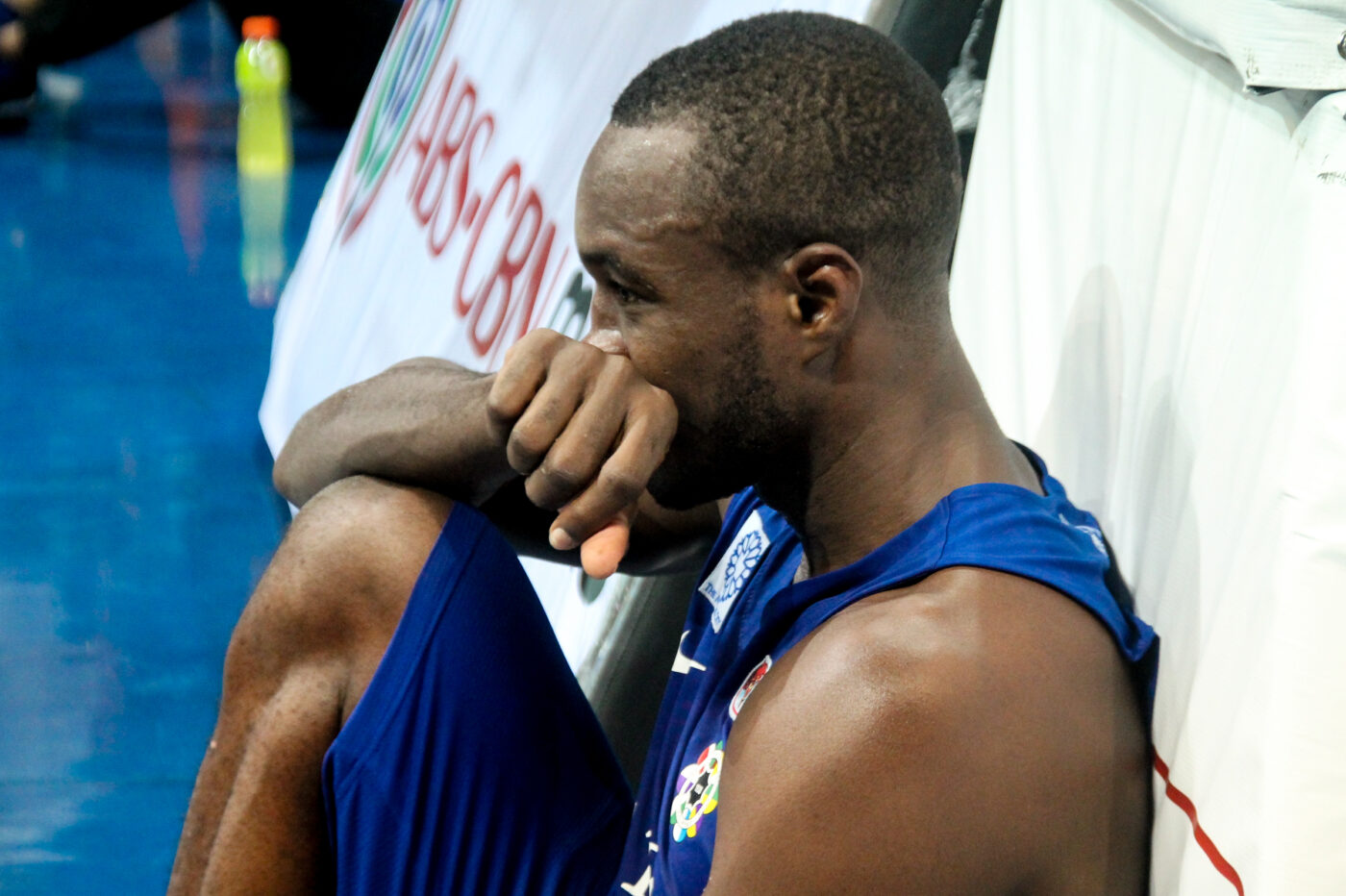THE ATENEO Blue Eagles’ 74-65 victory over the University of the Philippines on Wednesday, November 4 marked the Blue and White’s fourth consecutive win in the University Athletic Association of the Philippines (UAAP) Men’s Basketball tournament, giving them a record of 8-4 at the time.
For both the crowd in attendance and those watching from their homes, it seemed like the Blue Eagles were peaking at the right time. With a Final Four berth clinched after their victory, the Blue and White could focus solely on their remaining games of the elimination rounds.
However, as the team was set to leave the Araneta Coliseum, Quezon City Police District (QCPD) police officers arrived in search of Cameroonian center Chibueze Ikeh. A warrant of arrest had been issued against him for allegedly violating section five of the Republic Act. No. 9262, otherwise known as the Anti-Violence Against Women and Their Children Act.
Police escorted Ikeh out of the Araneta Coliseum and brought him to Camp Karingal, where he would stay until the next day. His legal representation eventually posted his Php 24,000 bail and Ikeh was released.
It was a surprising development for the Ateneo community, who are still recovering from the drunk driving incident involving Ateneo forward John Apacible. While Apacible was suspended by the team for the rest of the elimination rounds, Ikeh was cleared by the team to continue playing.
The big man eventually played the next Sunday in a 73-62 win over perennial archrivals De La Salle University and is expected to play in the Blue Eagles’ last elimination round match against the University of the East on November 14.
A previous complaint
In an article by the Philippine Daily Inquirer, a woman by the name of Elsa Payumo-Ulloa filed the complaint against Ikeh in 2014. Payumo-Ulloa reportedly met Ikeh through her job as a representative for Guam basketball.
Another report by the Tiebreaker Times indicated that the warrant for Ikeh’s arrest stemmed from his non-attendance of a scheduled preliminary investigation, and subsequently, failed to produce a counter-affidavit as well.
In an interview with The GUIDON, Office for Student Services Director Cholo Mallillin and Assistant to the Vice President of the Loyola Schools for Formation Rene San Andres both confirmed that before a case was filed against Ikeh with the QCPD, Payumo-Ulloa initially filed a complaint with the Ateneo on two grounds: One being an academic dishonesty allegation and another, with regards to violence against women.
San Andres, who was then the Associate Dean for Student Affairs when the initial investigation of Ikeh’s case came to his attention, also confirmed that the charges against the Cameroonian did not push through due to lack of evidence.
“I investigated both,” he said. “The only reason I am investigating this is because the allegations are that this happened inside the school, or in an official school activity,” he explained. He also added that there was no dishonesty involved in the matter and that it could be “amicably settled between the two parties.”
San Andres ultimately suggested that Payumo-Ulloa pursue her case somewhere else. “I advised her: If you’re really adamant about this, the proper venue perhaps is not [inside the Ateneo],” he said. “Wala ka masyadong basis here (You do not have much basis here).”
After the complaints against Ikeh failed to push through, Mallillin said that the jurisdiction over the matter was transferred to the University Athletics Office (UAO) to handle, as this was no longer considered as an academic disciplinary matter.
Contrasting controversies
The incidents of both Apacible and Ikeh have brought unwanted attention to both the school and the team. That being said, both incidents have also been handled differently by the Ateneo administration and the UAO. San Andres pointed out that this is because the cases of the two Blue Eagles are “substantially different.”
While Apacible was not criminally charged for his offense in the rule of law, San Andres states that it is still possible that he will be charged under Ateneo’s Code of Discipline of the Loyola Schools.
“The rules of court outside do not apply to our student disciplinary process because a student disciplinary process is an administrative process,” San Andres explained. “An administrative process is a set of policies, rules, procedures that you set in place to ensure that you will be able to do our work, and our work here is to educate young people.”
In addition to San Andres’ interpretation, Mallillin explained that while there is a substantial amount of evidence that could be used against Apacible should there be a disciplinary case for the sophomore, Ikeh’s case lacks such for the Ateneo to possibly charge Ikeh with a disciplinary case of his own.
Mallillin said that the misdemeanor of Apacible was evident, although he was never arrested or charged for anything by the law. “We’re proceeding now from the fact that there was a public misdemeanor and it tarnished the name of Ateneo, and that’s why we can actually proceed in finding grounds for a probable disciplinary case against him.”
Ikeh, on the other hand, was arrested and charged within the rule of law. However, Mallillin cites the lack of evidence against the Cameroonian as the reason the Ateneo has not pursued a disciplinary case against him.
“Kung ma-convict siya [Ikeh], then he would fall under our jurisdiction (If Ikeh is convicted, then he would fall under our jurisdiction),” said Maillillin.
Editor’s note:The original headline published on this site was, “Ateneo officials clarify Ikeh’s academic standing.” This has since been changed.








#TeamPhenom #AlyssaKiefer4Ever #otwol